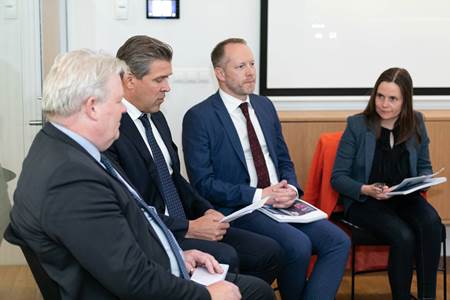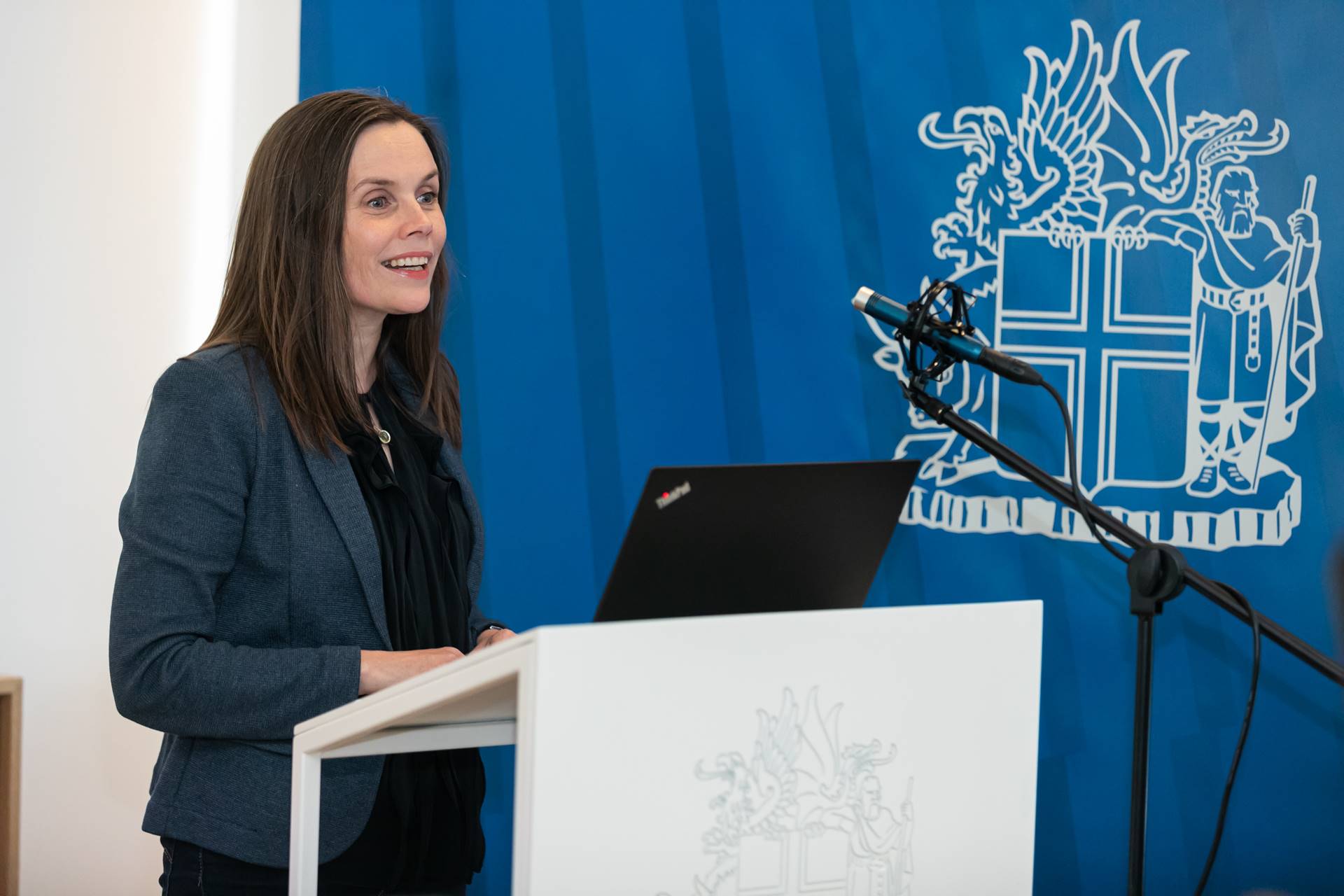New Climate Action Plan - Iceland will fulfil its commitments and more
- With the measures presented today, Iceland is expected to achieve a 35% reduction in greenhouse gas emissions by 2030 – The binding Effort Sharing reduction target to meet the commitments of the Paris Agreement requires 29% reduction.
- According to rough estimates, additional measures currently under development could result in a further decrease of 5-11%, bringing the total reduction in emissions to 40-46% compared to 2005 levels.
- 48 measures, 15 of them are new.
Prime Minister Katrín Jakobsdóttir, Minister for the Environment and Natural Resources Guðmundur Ingi Guðbrandsson, Minister of Finance Bjarni Benediktsson and Minister of Transport and Local Government Sigurður Ingi Jóhannsson presented the second version of the Climate Action Plan today.
According to the Climate Action Plan, emission reductions from the Effort Sharing sectors (non-ETS) are estimated to be more than one million tonnes of CO2 equivalents lower in 2030 than 2005 levels. This means that Iceland will meet its binding Effort Sharing reduction target of 29% and even more - with a 35% reduction.
In addition to this, further 5-11% emission reduction is expected from measures that are presented in the plan but remain yet to be quantified, a total of 40-46% reduction.

Prime Minister Katrín Jakobsdóttir: “Decisions and strategies based on science provide the best foundation for success, as events this spring have so clearly demonstrated. The government’s Climate Action Plan is based on such a foundation, which is very gratifying. It is our duty to safeguard the interests and well-being of future generations, and we do this by taking decisive action on climate issues, that will help prevent the unforeseeable consequences of catastrophic global warming. I am proud to head a government that is presenting this plan, that demonstrates that we can achieve ambitious climate targets."
Guðmundur Ingi Guðbrandsson, Minister for the Environment and Natural Resources: “This new Climate Action Plan marks a turning point in climate issues in Iceland. Immediately in its first months in office, the government undertook climate actions and allocated funding towards these issues. With the measures that we have now taken and intend to implement, we will achieve greater progress than international commitments under the Paris Agreement require of us. Which is definitely to be celebrated. We intend to continue to further our efforts to ensure the necessary transformation."
Over a five-year period, from 2020 to 2024, ISK 46 billion will be allocated to the major climate actions. The Action Plan consists of 48 measures, including 15 new ones, which have been added since the first version of the plan was released in the autumn of 2018. In tandem with the extensive consultation process for the new version of the Action Plan, emphasis has been placed on implementing these measures immediately. As a result, 28 of the 48 measures have already been set in motion.
Bjarni Benediktsson, Minister of Finance and Economic Affairs: “We are meeting our international commitments and doing even better - not by imposing strict obligations on households and the business community but rather with a wide variety of measures, that extend across the entire society, and by encouraging developments that are already taking place towards a more climate-friendly economy. Projections for emissions indicate that, already as a result of government actions and technological developments, greenhouse gas emissions will decrease in the next few decades, but the Climate Action Plan lays the foundation for even greater achievement."
More weight has now been placed on changing travelling behaviour, like encouraging walking and cycling and waste management. Various types of climate-friendly changes in society are actively encouraged, and emphasis is placed on actions where the state can lead the way in important changes through its own positive action.
New measures included in the Plan following consultations are i.e. measures to increase domestic vegetable production, increase the number of green rental cars, promote energy transition in heavy transport, carbon capture of emissions from industrial processes, improved feeding of livestock to reduce enteric fermentation and mitigation of emissions from the building sector.
Sigurður Ingi Jóhannsson, Minister of Transport and Local Government: “Climate issues are one of the most urgent challenges of our time and it is significant that the nations of the world have joined hands in response. Iceland's plan is ambitious. One important aspect is to ensure that the public can take part in the changes that need to take place and feel that each and every person’s contribution matters. Energy transition in transport plays a major role here. It is also clear that Iceland has economic interests at stake in switching to green energy sources because many billions currently flow out of the country to buy fossil fuels."
Underpinning this new version of the Action Plan are detailed calculations of the benefits of the measures presented. They were assessed by experts from the Ministry of the Environment and Natural Resources, advisors from the Environment Agency and a team of scientists at the University of Iceland and the University of Reykjavik. It was possible to assess the benefits of 23 actions, through which Iceland will achieve an estimated 35% reduction in emissions by 2030. Due to their nature, it is not possible to assess the impact of nine actions. In addition to this, further 5-11% reduction of emissions, is expected from 16 measures presented in the plan but remain yet to be quantified, which would make the total reduction 40-46%.
This second version of the Climate Action Plan presented today will continue to be subject to continuous review, just as the previous version. Measures will be updated, and new ones added as needed to ensure the Plan's continued success.
The Climate Action Plan was prepared by a task force comprising representatives of the Prime Minister; Minister of Fisheries and Agriculture; Minister of Tourism, Industry and Innovation; Minister of Education, Science and Culture; Minister of Finance and Economic Affairs; Minister of Transport and Local Government; and Association of Local Authorities in Iceland, under the leadership of the Ministry for the Environment and Natural Resources.
The Climate Action Plan has now been placed in the government’s Consultation Portal for the next three months, offering the general public the opportunity to submit comments and suggestions until 20 September this year.



